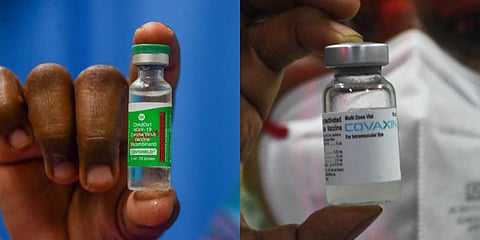

NEW DELHI: A very minuscule but definitive risk of thromboembolic (blood clot) events -- 0.61 cases per million vaccinations -- has been seen among those administered the Covishield vaccine in India, the National Adverse Events Following Immunisation (AEFI) committee has said in a report to the Ministry of Health and Family Welfare.
The data is based on an in-depth case review of 498 out of 700 serious and severe events following the administration of over 7.5 crore Covid vaccine doses in India till April 3, by the national adverse event following immunisation committee.
The report by the AEFI panel showed that a total of 26 thromboembolic events were found out of the 498 cases, from the total 700 serious and severe adverse events, that have been examined in detail so far.
The committee has submitted its report to the Union Ministry of Health. “AEFI data in India showed that there is a very minuscule but definitive risk of thromboembolic events (formation of a clot in a blood vessel that might also break loose and carried by the blood stream to plug another vessel),” said the ministry in a statement.
It, however, did not reveal how many people had died due to this complication in India.
The reporting rate of these events in India is around 0.61 per million doses, which is much lower than the 4 cases per million reported by the UK’s regulator Medical and Health Regulatory Authority while Germany has reported 10 events per million doses, the government said.
There were no potential thromboembolic events reported following administration of Covaxin vaccine, the analysis by the AEFI committee has shown.
Till April 3, 75,435,381 vaccine doses had been administered in India -- 68,650,819 doses of Covishield and 6,784,562 doses of Covaxin.
Of these, 65,944,106 were first doses and 9,491,275 second doses. Since the Covid vaccination drive was initiated, more than 23,000 adverse events were reported through the CoWIN platform reported from 684 of the 753 districts of the country.
Of these, only 700 cases or 9.3 cases per million doses administered were reported to be of a serious and severe nature, according to the AEFI committee.
The panel has underscored that thromboembolic events keep occurring in the general population as background and scientific literature suggests that this risk is almost 70% less in persons of South and South East Asian descent in comparison to those from European descent.
The government, however, insisted that Covishield continues to have a definite positive benefit risk profile with tremendous potential to prevent infections and reduce Covid deaths.
The Health Ministry, it said, is continuously monitoring the safety of all Covid vaccines and is promoting reporting of suspected adverse events.
Following the findings of the committee, separate advisories will be issued to healthcare workers and vaccine beneficiaries to make them aware of suspected thromboembolic symptoms occurring within 20 days after receiving any vaccine, mainly particularly Covishield, and report preferably to the health facility where the vaccine was administered.
The development comes following persistent demands by public health experts and activists to release data on serious adverse events since Covid vaccination drive was started in the country in mid-January.
Signs and symptoms that may suggest possible blood clot event following vaccination: